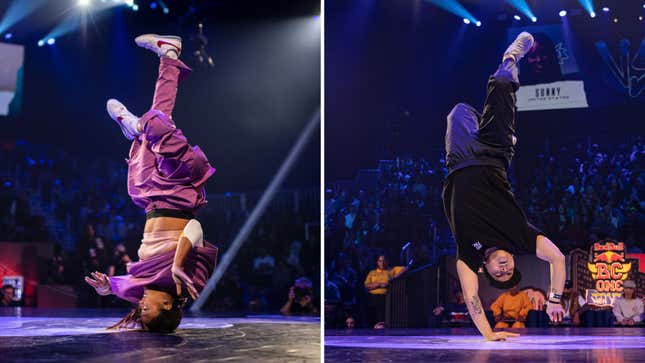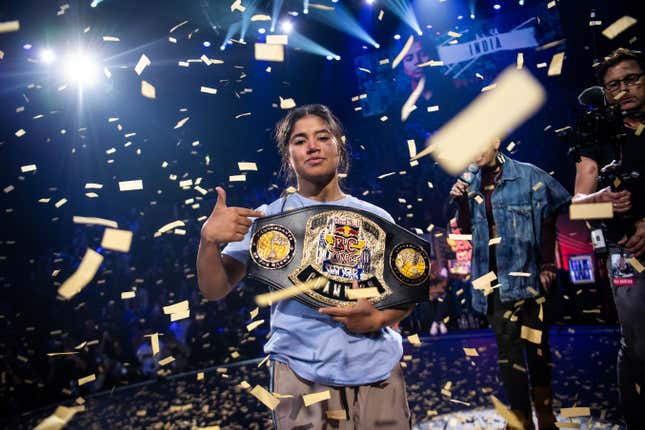For the First Time, Breakdancing Will Be at the Olympics. These B-Girls Plan to Be There Too.
Logistx and Sunny, two champion breakers, talk to Jezebel about the sport’s past, present, and their (hopefully) Olympic 2024-bound future.
In Depth

Over the weekend, the Red Bull BC One World Final, the Super Bowl of the breakdancing world, returned to the heart of breaking culture for the first time in thirteen years: New York City. The birthplace of hip-hop has always been storied in street culture for its beginnings—for rap and underground vogue battles and house music, the decades-old brainchildren of Black and Brown New Yorkers. But today, the city’s breaking culture looks different. And so do its breakers.
“I was taught breaking through the culture, going to jams at eight years old just for fun and to vibe out…it’s always been inclusive,” 19-year-old B-Girl runner-up Logan Edra aka “Logistx” said in a Zoom interview with Jezebel last week. “We’re always saying hip hop changes lives, hip hop saves lives, but it really does. The only way for us to continue to do that is if we really educate ourselves about what is truly at [breaking’s] heart and work to preserve that part of it.”
That sense of welcoming—the feeling of being ushered in by artist-athletes who are infinitely cooler and more stylish than you—is baked into the community, Edra explains.
When she was 18, Edra won Red Bull’s 2021 B-Girl competition, making her the youngest-ever champion at the time. This year, the reigning champ was defeated by 16-year-old India from the Netherlands, smashing Edra’s prior record for the youngest winner and cementing the Gen-Z B-Girl community as a dominant force. Given that breakdancing is set to make its Olympic debut in the Paris 2024 summer games, and that the 2022 Final aired on ESPN+ for the first time in history, that also makes this community of super-athletes one to watch.
Following the completion of 60 qualifier events across 30 countries over the course of the year, the best breakers in the world convened for a number of snazzy events and dinners in Manhattan. For my first entreé into the scene, the competition felt like a grand opening: a high-octane fireworks show offering the very best, and most intense, the breaking world has to offer. Unlike most organized sports, judging is largely subjective, decided this year by former breaking elites Ayumi, FaBGirl, Kid Glyde, Jey, and Sick. In a series of one-on-one battles, judges look for mastery of technique for the more acrobatic tricks and stalls, as well as authenticity, musicality, and stylistic stage presence before voting for a breaker to advance. An emcee djs the music live, so breakers have to be prepared to hop on the beat and showcase their best freestyle, all while getting in their competitors’ face, syncing to the music, pulling off athletic spins, and showcasing originality.
Breakdancing, the event’s host explained during a dinner leading up to the final, is one of the four pillars of hip-hop, alongside djing, rapping or emceeing, and graffiti (“graf” or “writing”). And while all four pillars have historically been dominated by men, B-Girl culture at this year’s final felt less like something to marvel at, and more like a pillar in its own right.
Modesty makes me feel a little bit more comfortable in this very heavily male-dominated community.
But the B-Girl community, says 34-year-old Sunny Choi, has always been small, and inclusivity hasn’t always been the case. When Choi started her breaking career back in college nearly 15 years ago, she says there were so few women that the culture felt difficult to break into, if not, at times, territorial: There was the B-Girl of the Northeast, and the B-Girl of New York City. Choi, from Philly, was left feeling like an intruder in the community.
Choi told Jezebel she prefers to be referred to as a “breaker,” as opposed to a “B-Girl,” which she says reinforces the gender binary, especially in a setting where she’s been made to feel modest about her body. “Even the burns that people do [in competition], they’ll literally pretend to take their cock and put it in somebody’s face,” Choi said. “I feel like that’s where that insensitivity towards gender diversity comes into play.”
Choi wears “purely functional clothing” when she’s breaking—baggy pants, a hoodie, a baggy shirt, and a jersey tucked in, all of which make her look like “a little boy,” she laughs. She remembers being at practice years ago when her shirt came up while dancing and someone made a comment. Now, her clothing helps protect from that happening again. “You can never see my stomach when I go upside down,” she said. “Modesty makes me feel a little bit more comfortable in this very heavily male-dominated community.”
When we spoke before the finals, Choi’s head wasn’t so much in outfitting choices as it was in survival mode. Outside of being a world-renowned breaker—the 2022 US Red Bull BC One National Champion and 2024 Olympic hopeful—she works a “demanding” full-time job: She’s the global creative operations director at Estee Lauder. When I ask how she’s making time for elite strength training, practice, and a corporate leadership role, she laughs when she realizes she doesn’t have an answer.
“There’s a reason why, up until now, I’ve had my full-time job,” Choi says, adding that she is hoping to transition to breaking full-time soon. “The pay disparity at some of the very, very large events, even just a couple years ago, was something that you would look at and be like, ‘Wow, that’s kind of appalling.’”
While she says brands are starting to catch onto the breaking hype—a unique combination of athleticism and artistry that closely resembles the skill required of gymnastics and ice skating—endorsement opportunities are still pretty narrow outside of Red Bull and Monster, and even harder for women to secure.
But it’s encouraging to hear that Edra, a Nike-sponsored athlete who’s part of the next-gen of breakers, has felt nothing but included since she started in the field. She was taught by “a lot of guys” and had a B-Girl mentor at an early age—something she admits is rare. Choi, on the other hand, says the style’s overwhelming machismo “doesn’t really breed a very comfortable or safe environment necessarily for everybody.” While she points to a number of queer women in the community who’ve fit right in, she believes it’s still harder for queer men to break into the fold, due to the art form’s reliance on its macho roots and a rigid definition of masculinity.

But both can’t wait to represent their sport, their art, and their culture at the Olympics. As Edra puts it, “If I’m going to do something as big as the Olympics, I’m not gonna half ass it. I’m gonna go full on.” A total of 32 athletes (16 B-Boys and 16 B-Girls) will compete in the first-ever Olympic breaking competition in Paris, but both Edra and Choi have got multiple hills to climb before they can claim Olympian status. Whether at the 2023 World Championship, the Continental Games/Championships, or the Olympic qualifier series that will run from March to June 2024, expect to see them both battling it out for a spot on the world stage. Regardless of how that journey plays out, they’re prepared to make a splash.
“I do feel like we’re a little bit behind. We’re moving slowly, but we are moving,” Choi says. “From the beginning, I’ve wanted to do everything that the guys can do, but better. So I have that little piece of me that keeps me going.”